Insights Discovery Profiles and Workshops
Seven Institute is an Insights Discovery Partner and Distributer
Page Contents
Try our free Insights Discovery teaser test
The Insights Discovery Profile

The Insights Discovery Profile is a personalised tool that reveals your unique working style, communication preferences, and behavioural patterns. Using the four-colour model, it offers practical insights to enhance self-awareness, communication, and teamwork. With clear feedback, it empowers you to make meaningful changes, boosting both personal and professional effectiveness. Unlock your potential and thrive in any environment.
Information:
This link will take you directly to the Insights Discovery evaluator where you will be asked to complete 25 sets of questions. Once the process is completed, a member of our team will be in touch to finalise the purchase.
Use the Referral Code: Website
Expected time to complete the evaluator: 15 to 20 minutes
Create an Insights ProfileClick to see what's in the profile
This Insights Discovery profile is based on Z N's responses to the Insights Preference Evaluator which was completed on 06 April 2019. The origins of personality theory can be traced back to the fifth century BC, when Hippocrates identified four distinct energies exhibited by different people. The Insights System is built around the model of personality first identified by the Swiss psychologist Carl Gustav Jung. This model was published in his 1921 work “Psychological Types” and developed in subsequent writings. Jung’s work on personality and preferences has since been adopted as the seminal work in understanding personality and has been the subject of study for thousands of researchers to the present day. Using Jung's typology, this Insights Discovery profile offers a framework for self-understanding and development. Research suggests that a good understanding of self, both strengths and weaknesses, enables individuals to develop effective strategies for interaction and can help them to better respond to the demands of their environment. Generated from several hundred thousand permutations of statements, this profile is unique. It reports statements which your Evaluator responses indicate may apply to you. Modify or delete any statement which does not apply, but only after checking with colleagues or friends to identify whether the statement may be a “blind spot” for you. Use this profile pro-actively. That is, identify the key areas in which you can develop and take action. Share the important aspects with friends and colleagues. Ask for feedback from them on areas which seem particularly relevant for you and develop an action plan for growth personally and interpersonally.
Exhibiting boundless energy and the ability to perform a number of roles simultaneously, Z can develop a level of result expectation that others may find daunting. Developing, fostering, improving and honing his skills is likely to be a life's work for him. He often pushes others as hard as he pushes himself and tends to be a challenging adversary. He can always see room for improvement and may spend his relaxation time trying, as he sees it, to make himself, and others, better. He is usually neat, tidy and orderly, both at work and at home. He may increase his effectiveness by allowing himself to seek and take assistance from others. He uses his thinking to run as much of the world as he can and is in his element when a situation needs to be organised, criticised or regulated. Seen as a “natural” leader, he wants to have a significant impact on the lives of others and may resort to dictatorial practices if anything appears to get in the way. He may in reality be less competent at a specific task than his confident style indicates. Logical, analytical and critical, achieving power is important to him. He will be prepared to constantly defend any stance or position he may have taken. Until untried ideas and theories have been tested and personally experienced, he will tend not to trust them. Z's ability to focus on task suggests that he is a good problem solver. Because he lives by principles and rules, Z is very consistent and dependable. He feels more secure when he can control a situation by ensuring other people conform to his thinking. Z is a pragmatic individual who can be as tough as the situation warrants. Z is outgoing and direct, but as a participant, he can, if he is not careful, take control of the process. He likes structure and systematic processes. Z is a highly practical person whose agile mind and skills combine well to generate fast results. People with whom Z works are aware of his excellent organisational qualities and commercial aptitude. Z is a resourceful, action-oriented person who lives for the future by making every moment count. Z is a good organiser and seeks to control the world around him with structure and discipline. At work he often makes significantly more starts than finishes and he may need someone else to follow through with the details. He is usually more effective when he takes time to consider how he really feels. He sees himself as having rigorous standards that typically take precedence over his own and others' personal needs. Eager to add to his knowledge, Z is passionate about researching significant new subjects that capture his interest.
Being respected by his peers is of greater importance to Z than being liked. He can be stubborn and argumentative. Although his emotional and social life may not seem as important to him as other aspects of life, he tends to seek consistent and stable relationships. He could learn to express his appreciation of other people regularly and may find it useful to listen more and appreciate how others really feel. He becomes frustrated if he is side-tracked by others' needs. He dislikes being told what to do or how to do it and may irritate others by insisting on doing a thing his way. He needs to make a special effort to remain open to the ideas and views of others, and avoid shutting other people down. Frequently reflecting, his intuitive feelings prompt a sense of the endless possibilities inherent within him as he considers how such potential may be realised. Although Z may protest about the pressure of attending family events, it would seldom occur to him not to be present, as these occasions are important to him. He does not appreciate critical comments about his personal qualities as he sees these comments as personal attacks on his integrity. Sometimes seen as blunt and forthright, he may tread on other people's toes without knowing it. He needs to be aware of being too outspoken, over-talkative and overly logical with some colleagues. He can be somewhat inconsiderate towards both himself and others, and tends to drive others almost as hard as he drives himself. He needs to learn to appreciate the “illogical” feelings of others and to accept that they are also valid. As he takes a rational approach to life, he may be seen as tough, blunt, impatient and insensitive to the needs and feelings of others.
Z is self-reliant and is not frightened to take “the path of maximum resistance” in his efforts to produce the best results. Z enjoys making decisions. He likes to be in control of things and values efficient and effective decision making. He has a sense of precision and pays attention to detail only if it suits him to do so. Z is extremely realistic and relies on and trusts what his senses tell him about his world. He always tries to decide as much as possible through logical, analytical and highly organised thinking. He needs to learn to consciously delay making decisions until he has considered more information as he may have overlooked sounder alternatives. He seeks realistic and satisfying solutions to challenges. He is outgoing, versatile and quick-witted, and may have an endless supply of solutions to whatever challenge he finds himself in. To make quick decisions he likes matters to be logical, so he requires and expects rationality in most situations. He prefers action to conversation and enjoys dealing with difficult situations the moment they arise. Z's many accomplishments are achieved mainly through determination and perseverance in reaching or exceeding his high standards. Although gifted in both sensing and intuition, he may well rather base plans and decisions on established procedures than listen to his inner voice. Z will be deeply committed whenever he chooses to undertake a role or task. His effectiveness depends on how much personal fulfilment he receives from the current task. In his mind there must always be a good reason for doing something and people's feelings alone aren't normally sufficient to influence him.
Strengths
This section identifies the key strengths which Z brings to the organisation. Z has abilities, skills and attributes in other areas, but the statements below are likely to be some of the fundamental gifts he has to offer. Z's key strengths:
- Maintains high standards in self and others.
- Sets precise goal oriented objectives.
- Realistic, adaptable and pragmatic problem solver.
- Strong willed, will not be blown off course.
- Enjoys a challenge.
- Rapid organisational skills.
- Good situational analysis.
- Embraces change readily.
- Drives himself and others to achieve results.
- Confident and forthright.
Possible Weaknesses
Jung said “wisdom accepts that all things have two sides”. It has also been said that a weakness is simply an overused strength. Z's responses to the Evaluator have suggested these areas as possible weaknesses. Z's possible weaknesses:
- May ride rough-shod over others' feelings.
- Will lose interest quickly if the challenge diminishes.
- May be stubborn in accepting others' ideas.
- Over reliance on traditional practices.
- May avoid innovative solutions.
- Often fails to take sufficient account of others opinions.
- Vocally judgmental and critical.
- Becomes defensive or dictatorial if challenged.
- Avoids showing his true feelings.
- May rely too much on past experience.
Communication can only be effective if it is received and understood by the recipient. For each person certain communication strategies are more effective than others. This section identifies some of the key strategies which will lead to effective communication with Z. Identify the most important statements and make them available to colleagues. Strategies for communicating with Z:
- Keep up with his pace.
- Provide incentives and encouragement.
- Point out the consequences, with care.
- Be enthusiastic and positive.
- Ask for his advice.
- Be thoroughly prepared.
- Act in an adult and mature way.
- Look for signs that say “I'm losing interest”.
- Let him know he is in control.
- Focus on the task at hand.
- Be clear about expectations and timescales.
- Leave personalities out of the discussion.
Communication Barriers to Effective Communication Certain strategies will be less effective when communicating with Z. Some of the things to be avoided are listed below. This information can be used to develop powerful, effective and mutually acceptable communication strategies. When communicating with Z, DO NOT:
- Keep him in the dark or he will do likewise.
- Be indecisive, unclear or “woolly”.
- Be vague or imprecise.
- "Steal his thunder".
- Confuse the conversation with irrelevant details.
- Digress or wander off at a tangent.
- Invade his privacy.
- Speak too slowly or hesitantly.
- Procrastinate, prevaricate or interrupt him.
- Criticise his ideas or take issues with them.
- Challenge his values or principles.
- Be dull, dour or redundant.
Our perceptions of self may be different to the perceptions others have of us. We project who we are onto the outside world through our “persona” and are not always aware of the effect our less conscious behaviours have on others. These less conscious behaviours are termed “Blind Spots”. Highlight the important statements in this section of which you are unaware and test them for validity by asking for feedback from friends or colleagues. Z's possible Blind Spots: Z strives after justice and wants to rectify injustice whenever and wherever he finds it - but his values must prevail. Very much a “head” person, he has little real appreciation of just how much some of his decisions may offend some people. Prone to negative reaction if he perceives someone he respects questioning his competence, he may react explosively to seemingly insignificant input. A take-charge type with very high control needs, he may not cope well personally when things do not go as planned. Attempting to be more flexible and open-minded will help prevent Z from becoming too rigid. He needs to resist the urge simply to perform and instead try to more readily share who he really is. Z may not always appreciate or solicit the views of others and might, as a result, miss a more suitable solution. He dislikes disorganisation, tardiness, sloppiness or inappropriate behaviour in both self and others and can sometimes generate an intensity inappropriate to the situation. As he doesn't readily look for different ways of doing things, he can appear inflexible or indifferent to others' views. Seen by many as a smooth talking persuader, Z may seem indifferent to people who appear to be less of an extraverted achiever than himself. He is honest and fair but can be seen as rather blunt and tactless in his ready criticism of others. As a logical and impersonal analyst, he doesn't always consider the impact of his decisions on others. Z should take care not to act on things too spontaneously, try to co-operate more, and learn to be more considerate of people's feelings.
The description in this section is based on Z's opposite type on the Insights Wheel. Often, we have most difficulty understanding and interacting with those whose preferences are different to our own. Recognising these characteristics can help in developing strategies for personal growth and enhanced interpersonal effectiveness. Recognising your Opposite Type: Z's opposite Insights type is the Supporter, Jung’s “Introverted Feeling” type. Supporters are affable, amiable, steady, loyal individuals who get on well with others. They build a close relationship with a small group of associates in the work environment. Z will see the Supporter’s efforts being directed at retaining the familiar and predictable. Supporters look for constant appreciation from others and may be slow to adapt to change. They will often go the “extra mile” to help someone they consider as a friend. Z may suspect the Supporter requires assistance in eliminating the old and embracing the new. Supporters are cautious, conventional, diplomatic and sincere and may avoid decision making until many of the facts and details are available to them. The Supporter is intent on maintaining a low profile. In order to perform well, the Supporter needs specific and detailed instructions before starting a job. Z will experience frustration when the Supporter, if challenged, becomes stubborn and defiant. Supporters are easy going and low key people and like to feel needed and significant in other peoples’ lives. Even if a mistake has been made by someone else the Supporter may spend a lot of time sympathising and attempting to diffuse responsibility. Disagreements or opposing views can be stressful to Supporters. If the conflict in the workplace becomes too great they may become restless and uneasy, often withdrawing to avoid further conflict.
Opposite Type Communication with Z's Opposite Type Written specifically for Z, this section suggests some strategies he could use for effective interaction with someone who is his opposite type on the Insights Wheel. Z N: How you can meet the needs of your Opposite Type:
- Provide a safe environment in which he can learn, improve and grow.
- Give him advance notice and time to prepare.
- Maintain a consistent, personal relationship with him.
- Ensure he sees and agrees with the benefit of change before implementation.
- Provide lots of opportunities for team contact.
- Provide regular support and feedback - show interest. Z N: When dealing with your opposite type DO NOT:
- Try to rush him into a decision.
- Dismiss his work, ideas or opinions lightly.
- Force quick decisions where other people are affected.
- Prevent him from expressing his thoughts.
- Set deadlines you really believe cannot be reached.
- Undervalue his ability to make essential contributions.
Insights Discovery does not offer direct measures of skill, intelligence, education or training. However, listed below are some suggestions for Z's development. Identify the most important areas which have not yet been addressed. These can then be incorporated into a personal development plan. Z may benefit from:
- Sitting back, saying little and observing.
- Taking time out to indulge himself in simple pleasures, such as music and the arts.
- Controlling his occasional moments of anger.
- Being less forthright and more discreet.
- Withholding his opinions.
- Being more prepared to acknowledge his mistake.
- Reducing his high profile stance.
- Reducing the level of activities in his life.
- Arguing the opposing position to recognise the value of it.
- Not always appearing so direct and confident.
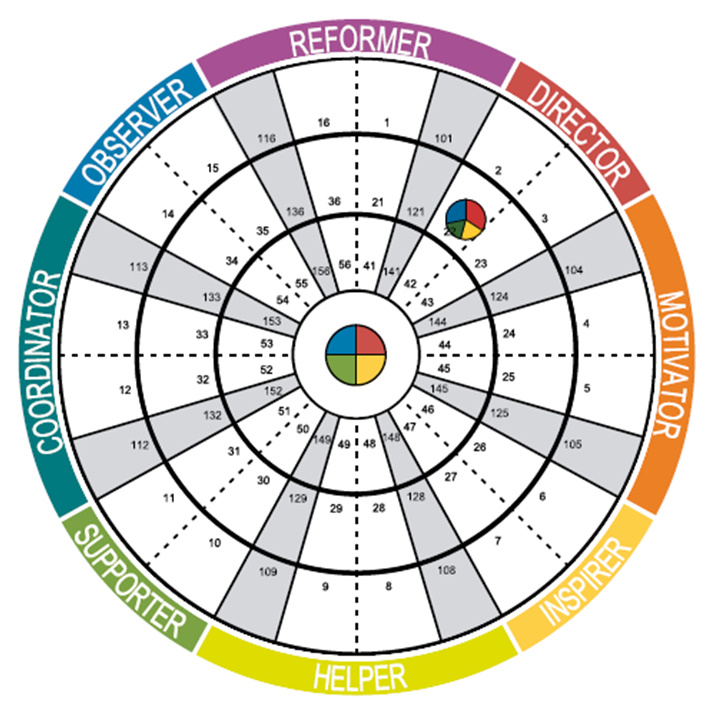
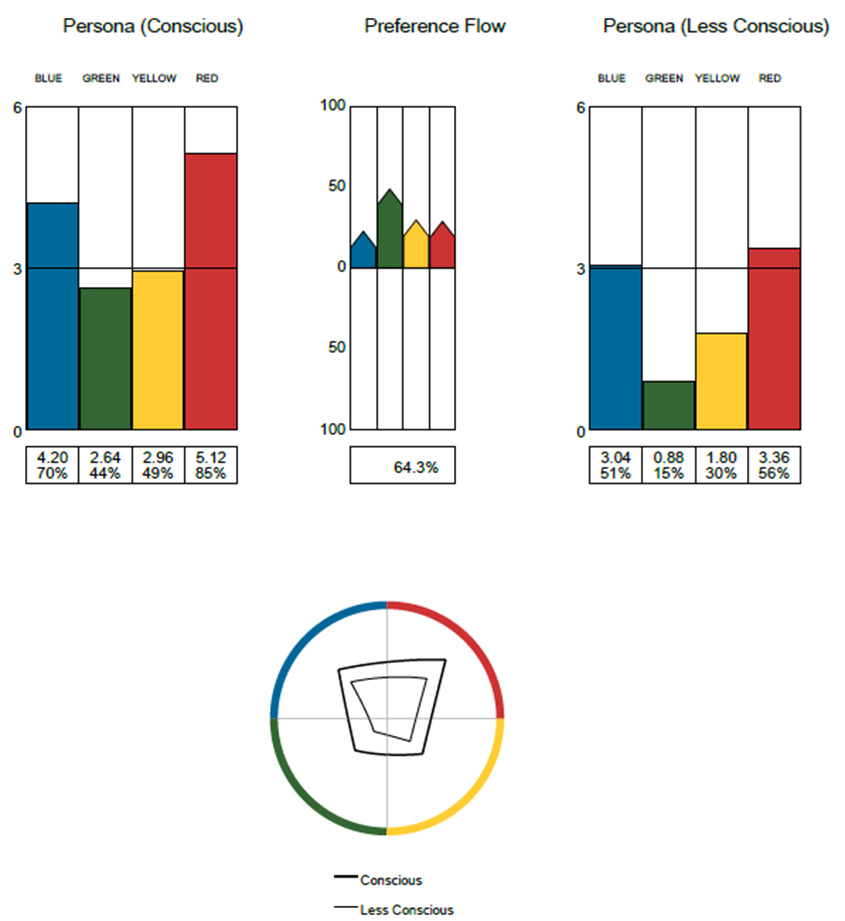
Our customers

















Insights Discovery Team Reports
What is an Insights Team Report?
The Insights Team Report is a detailed analysis of multiple Insights Discovery profiles, designed to provide valuable insights for teams and groups.
What is the report used for?
This report is ideal for teams seeking to explore areas such as team culture, communication, collaboration, and conflict resolution. It is also helpful for improving individual relationships, whether with colleagues at work or in personal settings.
How many profiles can be included in an Insights Team Report?
The report can include between 2 and 10 profiles.
How is the report created?
An accredited Insights Discovery practitioner produces the report, combining advanced AI technology with their professional expertise to deliver insightful and actionable results.
Can a debrief on the report be arranged?
Yes, a practitioner can provide a thorough debrief on the report. Bespoke workshops can also be designed and delivered to align with the report’s insights and the needs of your team.
Is there a follow-up to help embed Insights within the team?
Certainly. Each profile is uploaded to Tuhura, our AI-driven online platform. Team members are given access to Tuhura, allowing them to analyse their profiles and connect with colleagues who choose to share their profiles.
What does an Insights Discovery Team Report cost?
Prices start at £300.00 plus VAT for up to 6 profiles. Additional profiles cost £50.00 plus VAT each.
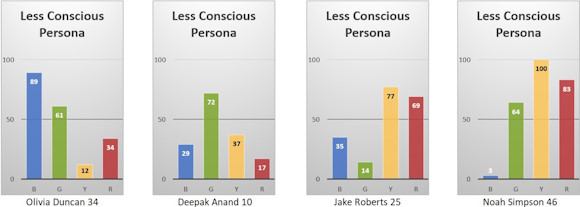 Download a Team Report example
Download a Team Report example
Example Team Report Content
- Overview of the Insights Discovery System
- Overview of the individual profiles
- Overview of the Team Wheel
- Dominant v Preferred team energies
- Conscious and Less Conscious chart summary
- Team Analysis
-
Specialist Areas of Interest
- Enhanced Team Collaboration
- Client Interaction (Internal and External)
- Team Meetings
- Management
- Engaging with Management
- SWOT Analysis
- Transactional Analysis
Our Insights Discovery Training
Our most popular workshops are now offered in both face to face and virtual formats. You can choose a half day or full day format to suit your requirements.
Have a question? Call us on 0800 1337 401 or contact us.
Introduction to Insights Discovery
The Introduction to Insights Discovery - Beginning your Journey is a dynamic, engaging introduction workshop that helps individuals and teams grasp the theory of the Insights Discovery system. This workshop covers the foundational theory of Insights Discovery starting with Carl Yung's three preference sets: Introvert v Extrovert, Thinking v Feeling, and Sensation v Intuition. Delegates will explore the four colour energies of the Insights Discovery model: Fiery Red, Sunshine Yellow, Earth Green, and Cool Blue as well as identifying the eight psychological types: Director, Motivator, Inspirer, Helper, Supporter, Observer, and Reformer. Delegates will understand their own energy mix and how to practically apply the Insights Discovery system.
Topics Covered
- Understanding Perception
- Learn about the Jungian preferences
- Learn about the four Discovery Energy Colours and identify your colour mix
- Learn the 8 personality types of Insights Discovery
- Explore and understand your own personal Insights Discovery Profile
- Explore and understand others personal Insights Discovery Profile
- Learn how to identify the colour energies in others
- Learn to adapt your behaviour
- Create a plan of action
Full Day – Half Day – 90 Minutes - Coaching
Order NowInsights Discovery and Leadership
Gallup research suggest that managers account for 70% of the variance in employee engagement, engagement that increases productivity, sales, and retention. The Insights Discovery leadership workshop strengthens the leader's self-awareness and other-awareness, equipping leaders to become more adaptable and situation driven influences of the team and organisations culture. The workshop explores the four manifestations of leadership; Results Leadership, Visionary Leadership, Relationship Leadership and Centred Leadership focusing on the key motivators and blockers that drive the four colour energies. Delegates will learn how to use the Insights Discovery system to enhance the employee experience throughout their entire life cycle.
Topics Covered
- Traits of great leaders
- The four colour energies in leadership
- The four manifestations of leadership
- Motivating the colour energies
- Motivating the eight types
- My motivation as a leader
- Management chapter and decision making
Full Day – Half Day – 90 Minutes - Coaching
Order NowInsights Discovery and Teams
The Insights Discovery Team workshop will help delegates identify how to use the Insights Discovery system within the context of team. It may be a small team that works closely together or in the wider collaboration of multiple teams. The key emphasis is on recognising the different kinds of personality types within a team and helping delegates build the knowledge around how to adapt to their colleagues, in particular, those that are on oppositive sides of the Insights Discovery wheel. Delegates will Identify their teams dominant colour energy and the potential strengths and weaknesses of their energy mix. Delegates will assess and score how well their team is managing its processes, performance and people and identify strategies for improvement.
Topics Covered
- The Insights team effectiveness model
- Assessing team strengths
- Team culture
- Team colour energies
- Team process, performance, and people
Full Day – Half Day – 90 Minutes - Coaching
Order NowWatch Insights Discovery videos to choose the most suitable option
Individual
Order Now
Are you interested in learning more about what makes your personality unique? Increase your self-awareness and take your communication skills to a new level with the Insights Discovery personality profile. You will receive a foundational personality profile as well as a 30-minute online coaching session with one of our accredited practitioners. On top of the foundation profile you can add other chapters to increase your skills and knowledge including personal achievement, leadership and management, effective selling and interview skills. This product can change your life right now.
Team
Order Now
Are you looking to increase your team's effectiveness? Insights Discovery is an industry leading personality profiling tool that can do just that. Your employees will benefit from the knowledge gained through their individual profiles and by attending our workshops. Run by accredited practitioners, these workshops will increase your team's ability to work together, deliver results and build a culture of engagement and performance. By helping your team understand themselves and their colleagues better, you are giving them the opportunity to develop, succeed, and be the best they can be.
Leadership
Order Now
Leadership and Management is critical to any organisation's success and yet thousands of people are promoted every year without gaining the proper training required to equip them for their new roles. Insights Discovery is a dynamic tool that will help leaders at any level get the best out of themselves and those they lead. Our workshops and profiles ensure your managers understand the unique differences present in their teams. Delegates will learn to recognise these differences and adapt their leadership style accordingly. Don't wait until you start losing your best employees, invest in your leaders' development today.
Insights Discovery Virtual Training
Virtual Insights Discovery Courses
We deliver all our Insights Discovery courses in a convenient virtual format. While face-to-face training is a fantastic option, we understand that coordinating your team to be in the same location can often be a logistical challenge.
With over a decade of experience delivering virtual training globally, we make professional development accessible no matter where your team is based. Our network of accredited Insights practitioners spans the globe, and today’s advanced technology removes the barriers of location.
We regularly host virtual sessions for clients in the USA, Canada, Australia, New Zealand, Europe, and the UK, bringing high-quality, interactive training directly to your team, wherever they are.
Our virtual training also offers clients a more cost-effective option.
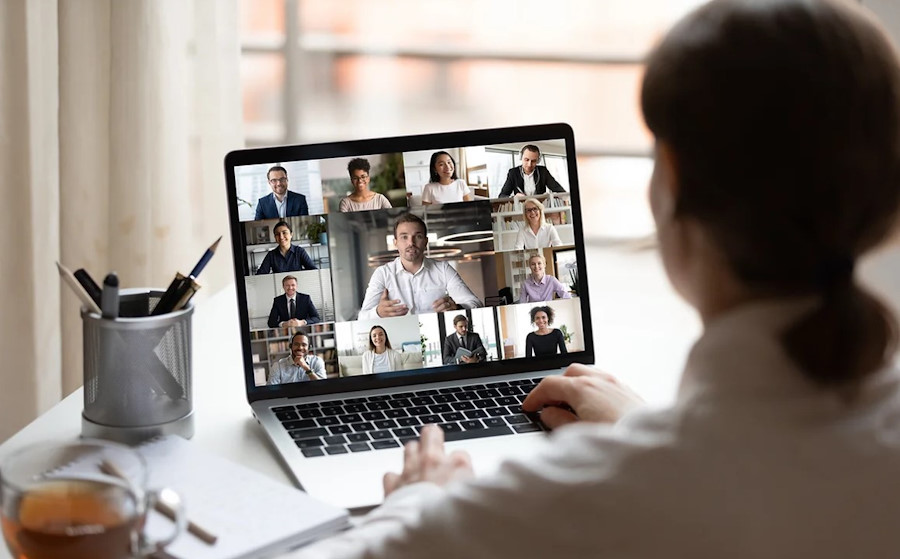
What are our virtual clients saying?
I thought you did a great job doing this remote. I know keeping your energy high with such a lack of non-verbal feedback was kind of amazing.
Mark, Loam Bio, United States
Another amazing and informative session with Paul. We were skeptical at first about having an online training session, but it felt like Paul was in the room with us the whole time. We all learned a lot about ourselves, our teammates and goals for our future as a company.
Jennifer, Tech Cayman, Cayman Islands
I learnt a lot about myself and was surprised by how scarily accurate the profile was. Paul was amazing, even though it was a three-hour meeting, Paul kept things lively and interesting.
Jas, Octopus Energy, UK
I am very happy I took part to the Insights Discovery workshop. I found it extremely interesting and useful, both for my professional and my personal growth.
Martina, European Heat Pump, Belgium
Contact us about a virtual training sessionThanks for checking in, all went really well yesterday, and it was a great session!
Sarah, Rio Tinto, Australia
The Self-Aware Leader – An Insights Discovery Solution
Empower Your Leaders with Self-Awareness for Transformative Growth
Build a Culture of Emotional Intelligence and Authentic Leadership
Self-aware leadership is transformative. The Insights Self-Aware Leader program equips leaders with a deep understanding of their strengths, motivations, and areas for growth. Through self-discovery, reflection, and practical tools, this program helps leaders develop the essential self-awareness that drives authentic, effective leadership, benefiting personal growth and team dynamics alike.
Why Self-Aware Leadership?
Self-aware leaders make better decisions, foster team trust, and drive engagement. They communicate with empathy, adapt under pressure, and inspire a culture of growth within their organizations. The Insights Discovery model provides a proven framework to uncover leadership potential while creating more effective communication and collaboration.
How It Works
This program offers a structured, reflective experience for leaders to explore their behavioral preferences and leadership styles. Using the Insights Discovery Personal Profile, participants gain actionable insights into strengths, challenges, and opportunities. This journey empowers them to lead authentically while building emotional intelligence and fostering innovation.
Leaders also engage with the Insights Discovery Transformational Leadership Profile, which explores eight critical leadership capabilities. These include inspiring vision, managing change effectively, and fostering team alignment.
Key Benefits of Insights Discovery
By embracing Insights Discovery, leaders enhance communication, boost employee engagement, and create inclusive, high-performing teams. The program emphasises emotional intelligence, adaptability, and innovation—essential traits for modern leadership. Trusted worldwide, Insights Discovery profiles offer scientifically validated tools for creating impactful leadership cultures that drive organisational success.
Who Is This Program For?
Perfect for:
- Emerging Leaders: Building a foundation in leadership.
- Experienced Leaders: Seeking to deepen self-awareness.
- Organisations: Developing a culture of introspection and authenticity.
Click to see the Transformational Leadership profile
This Insights Discovery Transformational Leadership Profile explores how Jane’s leadership capabilities are impacted by her psychological preferences. It will enable Jane to research how her unique Insights Discovery colour energy mix creates both strengths and challenges in her approach to leadership.
The Insights Transformational leadership model comprises eight dimensions of leadership. Each of these dimensions is underpinned by five leadership facets.
Agile Thinking - Engaging different thinking modes Leading from Within - Raising self-awareness and living your values
Facilitating Development - Nurturing the growth of self and others
Fostering Teamwork - Collaborating to build effective relationships
Communicating with Impact - Inspiring and influencing with emotional awareness
Creating a Compelling Vision - Determining a winning direction
Leading Change - Initiating and directing transformation
Delivering Results - Honouring commitments and exceeding expectations
Each dimension requires all four Insights Discovery colour energies to be used effectively and may pull most strongly on one or, in some cases, two particular colour energies.
For example, although ‘Fostering Teamwork – collaborating to build effective relationships ’ draws particularly on Sunshine Yellow and Earth Green energy, if it is to be done to a high standard, it will be supported through a blend of all four of the colour energies. Fostering Teamwork, therefore, can be mastered by anyone, no matter what their colour energy preference, as can any of the other dimensions of leadership.
After detailing Jane’s strengths and challenges linked to each of the eight dimensions, the profile offers some recommendations, and poses questions for Jane to explore further in this area. This is a powerful resource to help Jane understand how she can enhance her leadership capabilities and be more effective.
These statements provide a broad understanding of Jane’s leadership style. Use this section to gain a better understanding of how you lead self, as well as how you lead teams and organisations.
Self Leadership Style
Jane endeavours to be fair and reasonable in all her deliberations and she can always explain her rationale. She will state her views with quiet self-assurance and will do her utmost to adhere to her principles in every aspect of her leadership. She has got the belief and stamina to work through difficult patches in her work. She trusts her structured and well-organised approach in managing her commitments.
She is orderly, structured and particular, ensuring routine processes are followed. She operates in a steady and persistent manner with a high level of patience. She is steady and disciplined in getting things done, tending to keep on top of every aspect of her responsibilities. With a strong sense of 'right' and 'wrong', Jane prefers to operate according to her conscience than to others' requirements. She will do her utmost to ensure that any job is done with care and attention.
In leading herself, Jane will always identify her needs and wants in relation to the context rather than in relation to some imagined ideal. She uses her analytical skills to organise tasks efficiently. She applies a consistent approach to all her work requirements, leading to a high level of reliability. She is highly conscientious and will demonstrate commitment and self-discipline. Jane likes to have a system in place to ensure that nothing is overlooked in managing her commitments.
Team Leadership Style
She will be precise and clear when communicating what needs to be done and backs this up with expressions of encouragement. Rather than feeling the need to deal with problems on the spot, she will ask for time to think things through before coming back to the team with her recommendations. She considers team challenges long and hard and will only put forward suggestions that have been well thought through. She can retain a clear focus on the team's objectives without getting side-tracked by distractions.
As long as team members are adhering to the basic underlying principles and ethics, Jane will allow them to work in their individual ways without interference. Jane tends not to interfere in interpersonal conflict in the team and is happy to give others the autonomy to sort out their own issues. Jane is a caring and considerate leader who always makes time for others. Jane brings a stabilising influence to the team and helps to ensure consistency of output. She can take a sensitive yet pragmatic approach to task allocation within a team, giving credence to personal requests without being unduly swayed by them.
She feels a strong sense of personal responsibility for those she leads. She will create meeting agendas with team members that are practical and relevant whilst making allowances for personal needs. She uses her combination of cool blue and sunshine yellow energies to ensure that the team’s effort is well co-ordinated and cohesive. Typically, Jane brings reliability and stability to the team environment. She will seek to adapt her leadership approach to best suit the team, whilst ensuring that her personal output remains steady and structured.
Organisational Leadership Style
She aims to design highly economical resource plans that focus on maximum output with minimal expenditure. Jane is keen to identify and share ‘best practice’ across the organisation to ensure consistency of quality. She creates workable plans that are rooted in common sense and pragmatism. She aims to ensure a consistency of standard within the organisation, delivering a highly professional service that is technically proficient and personally engaging. She gains others’ respect as she stays committed to her quest without trying to influence others to blindly follow her. She will be prepared to support a delivery by taking on routine tasks that others don’t enjoy. Jane is a reliable, stable leader who co-ordinates tasks, staff and the organisation. She pays attention to producing a high quality and reliable product or service. She is readily able to spot discrepancies or inconsistencies in procedure and will point these out in order to deliver a consistently high standard of service.
She can be both cool headed and tough-minded in inspiring others to bring new projects and ideas into reality. She allows staff to take the time they need to evaluate their options and make their decisions. She is able to see beyond the short-term ups and downs and maintain a steady focus on longer-term aims. In striving for equality and co-operation, Jane adopts an unbiased stance and evaluates all views before acting. Jane has a strong sense of duty and will do her utmost to ensure all requests have been satisfactorily fulfilled.
Engaging different thinking modes
Transformational leaders can adapt and apply a variety of cognitive and intuitive processes to solve problems.
Strengths
- Enjoys extensive study and will collect a plethora of information from both technical and personal sources.
- Avoids ambiguity and manages her commitments by focusing on concrete facts, problems and solutions.
- Can generate new insights and create inventive solutions based on deep and intense inspection.
- Monitors performance and makes decisions based on a straightforward assessment of observable evidence.
Challenges
- While she excels at measurement and practical applications, she tends to shun abstractions or 'hunches' as unreliable and questionable.
- May try to “fit” others’ ideas into recognised concepts and theories rather than allow free-flowing expression and interpretation.
Recommendations
- When making a decision, assess any issues highlighted in discussion alongside other relevant data before reaching a final conclusion.
- Listen to the subjective opinions of others and allow them equal weight in her analyses and assessments.
Probe Strengths
- How do you assess the nuances of a major economic or industry shift and how might you translate this knowledge into an opportunity for your organisation?
- When have you most effectively used your past knowledge or experience to contribute to resolving a current issue or problem?
Probe Challenges
- When have you made a decision despite a desire for more information?
- Having identified a business opportunity for the company, how would you then put forward a recommendation and create a business plan?
Raising self-awareness and living your values
Transformational Leaders are authentic - they inspire others through their strong beliefs, values, attitude, authenticity, courage and sense of purpose.
Strengths
- Respects and follows systems, procedures and lines of authority.
- With a balance of pragmatism and creativity, believes in her ability to work through most of life’s challenges.
- Can take an analytical perspective when helping others define their values and is encouraging and engaging in the process.
- Lives by her principles and, during discussions with others, is unlikely to shift radically from her position.
Challenges
- Has a tendency to doubt her ability and underestimate her value.
- Her calm and gentle exterior may conceal an inner world of anxiety and uncertainty.
Recommendations
- Discipline herself to make sure she has some time off, free from cerebral concerns.
- Look for concrete evidence to question or refute any disempowering beliefs.
Probe Strengths
- Think back to a time of crisis in which you were accountable to respond to all or part of the crisis and reflect on how you coped?
- Reflect on your ability to think clearly under pressure.
Probe Challenges
- Summarise how you share your own opinions or feelings so others can understand you better.
- What aspects of yourself, personally, would you be comfortable sharing with your team?
Nurturing the growth of self and others
Transformational Leaders are effective coaches and mentors - empowering their people and understanding that exceptional results occur when people take responsibility for making things happen.
Strengths
- Creates development plans with others that are accurate, thorough and pragmatic.
- Is particular and thorough in unearthing any blind spots but will ensure an upbeat conclusion by encouraging a positive resolution.
- Will probe sensitively into the client’s circumstances so she can gain a greater understanding of their needs.
- When coaching others, communicates personal experiences only when necessary to make points, otherwise will withhold her own issues or opinions.
Challenges
- May be cautious when coaching or mentoring and will allow her clients to determine the rate of progress, rather than taking positive action to move them forward.
- When coaching, if her cool blue energy is overly dominant, can place too great an emphasis on practical considerations to the detriment of the important personal considerations.
Recommendations
- Ask more open ended questions to allow for some exploration and creativity in designing solutions for clients.
- Share her areas of expertise with others rather than hiding her light under a bushel.
Probe Strengths
- Consider a time recently you coached another person. What did you learn about them?
- Consider a recent decision you made to make a personal change. W did you do to put that decision into action?
Probe Challenges
- Summarise a new method you recently learned and applied to your work situation.
- What change have you most recently chosen to make for yourself to improve your life?
Collaborating to build effective relationships
Transformational Leaders create high-performing teams - teams that take collective decisions, value diversity, honour each member and are led from within.
Strengths
- Communicates with sincerity and respect with other well-established leaders in her network.
- Will carefully assess capabilities before assigning roles and ensure that any allocation of duties works well for the team as a whole.
- Acknowledges the importance of diversity within the organisation, respecting and appreciating the knowledge and experience of people at all levels.
- Appreciates and takes account of diversity and different skill sets to decide on the best and most effective resources available.
Challenges
- May not appear fully integrated into the team due to her apparent need for privacy and self-containment.
- Is acutely aware of when her team is not working co-operatively and can find it difficult to maintain her productivity in the resulting fragmented environment.
Recommendations
- Work towards accepting and verbally appreciating the value of those who work with less structured methods.
- Confer with her team on difficult issues rather than feeling she has to take it all on herself.
Probe Strengths
- What have you done recently to invest in developing your network of business relationships?
- Typically, how do you express appreciation for the work your team does?
Probe Challenges
- When have you taken your own concerns to your team to gather their input and experience? How were they able to help?
- Consider a time you got frustrated when dealing with a difficult customer. On reflection, what could have enabled this interaction to go more smoothly?
Inspiring and influencing with emotional awareness
Transformational Leaders engage their peoples’ hearts and minds - through understanding and appreciating their needs, wants and expectations.
Strengths
- Persuades others through clear thinking, logic, suggestions and debate, expressed in an engaging and inclusive manner.
- Uses an ideal combination of pragmatism and sensitivity in managing customer concerns.
- Networks and benchmarks with competitors to store good practice and get new ideas.
- Generally begins communicating by stating areas of accord and continues in a calm and clear manner.
Challenges
- Prefers to talk about others’ personal issues in a detached manner and may shy away from open, honest and emotionally expressive dialogue.
- With a high preference for the introverted colour energies, can find it taxing to have to interact regularly with others.
Recommendations
- Boost her self-motivation by using more energetic and enthusiastic body language in addition to her self-talk to generate a little more oomph!
- Experiment with using more emphatic words and phrases and notice how this affects her level of self-motivation.
Probe Strengths
- Describe a presentation you made to a team or clients in order to bring clarity and information.
- Can you describe how you have consciously amended your behaviour or approach to improve a relationship?
Probe Challenges
- Reflect on the last time you partnered with other professionals in your company, industry or customer base. What was the outcome?
- Describe your finest hour in speaking and acting confidently when representing your team or a project.
Determining a winning direction
Transformational Leaders predict the future through creating it. Their vision and purpose motivates and inspires others to follow.
Strengths
- Spends a significant amount of time in quiet contemplation, considering her aspirations for the future.
- Can think through her visions with clarity and sensitivity and can define which one is most effective for her to pursue.
- Will create innovative solutions that have the backing of a great deal of insightful forethought.
- Looks to logic before defining a vision that is pragmatic and worth pursuing.
Challenges
- Has a strong vision for the team, but finds it difficult to communicate any desire or urgency in making it happen.
- Focuses her efforts on gaining others' commitment to a vision by 'selling' the process of implementation as much as the content.
Recommendations
- Listen to the collective input from others and help to identify a vision that includes both personal and practical value.
- Involve herself in mental exercises that stretch her intuitive faculties so she can become more inventive in determining ways forward for her clients.
Probe Strengths
- Reflect upon a time when you recognised another person’s innovative thinking. What did you do to put their thinking into practice?
- Typically, how do you go about structuring a creative process?
Probe Challenges
- Reflect upon the last brainstorming meeting you attended. How did that go and how did you contribute?
- When have you personally brainstormed or simply created a list of possibilities without censoring yourself? What was the output?
Initiating and directing transformation
Transformational Leaders recognise the need for change and possess the drive and inner-strength to manage the ambiguities and uncertainties brought about by change.
Strengths
- Can manage transitions on a practical level by ensuring a steady, step-by-step approach, evaluating the effect of each stage as it happens.
- Understands end to end processes and associated challenges in the market place, and will use subjective and objective reasoning before taking a course of action.
- Looks to implement change that will be beneficial to the overall harmony and effectiveness of people and their environment.
- Even when she has to make difficult decisions, will remain optimistic as she usually has both concrete data and the support of the team to back her up.
Challenges
- Tends to overstate any potential risks and prefers to play safe.
- Will look to others to provide evidence for why change is needed.
Recommendations
- Learn to accept an element of risk and make decisions trusting that she has the necessary skills to handle whatever happens.
- Take a more adventurous approach to risk and trust that her cool blue intellect will enable her to identify any possible drawbacks and mitigate their impact.
Probe Strengths
- When has your persistence and energy proved helpful in a project?
- What is the most challenging change initiative you have dealt with in the past year and what did you do to address the challenge?
Probe Challenges
- What do you see as the boldest proposal or decision your have made in the past year?
- Consider the last change initiative you undertook. What did you do to engage the team members in the initiative?
Honouring commitments and exceeding expectations
Transformational Leaders take responsibility for performance and results - investing time and resource wisely - focussing on effectiveness over efficiency.
Strengths
- Will continually monitor progress and make reports to inform others of this.
- • In designing customer service procedures, will ensure she creates efficiently organised processes that seek to fulfil the customer’s perspective.
- Clearly identifies both what she and others in the organisation are doing and how they are doing it, to ensure a consistency of approaches and processes to achieve the best results.
- Ensures she communicates objectives clearly, focusing on well defined targets and results.
Challenges
- May not be disciplined in finishing projects on time as she is often tempted to keep considering alternative courses of action.
- May become overwhelmed with customer requirements due to her tendency to take on more while still thoroughly engrossed in her current responsibilities.
Recommendations
- Challenge herself to put workable solutions into action more quickly, even when they may not appear to be 100 percent perfect.
- Accept that the most highly resourceful plans have been designed with some flexibility and bring this into her equation before defining the final draft.
Probe Strengths
- Describe a time when you advocated or lobbied to remove barriers or to obtain additional resources for your team, which enabled them to achieve better results.
- Typically, how do you organise your work to ensure you are effective and that you get the task done on time?
Probe Challenges
- Allocating resources to achieve success may be like trying to hit a moving target. Summarise how you have dealt with changing priorities or kinks in your delivery plan.
- When have you hesitated taking action because you did not know all the risks involved? What did you need to know before you could get moving?
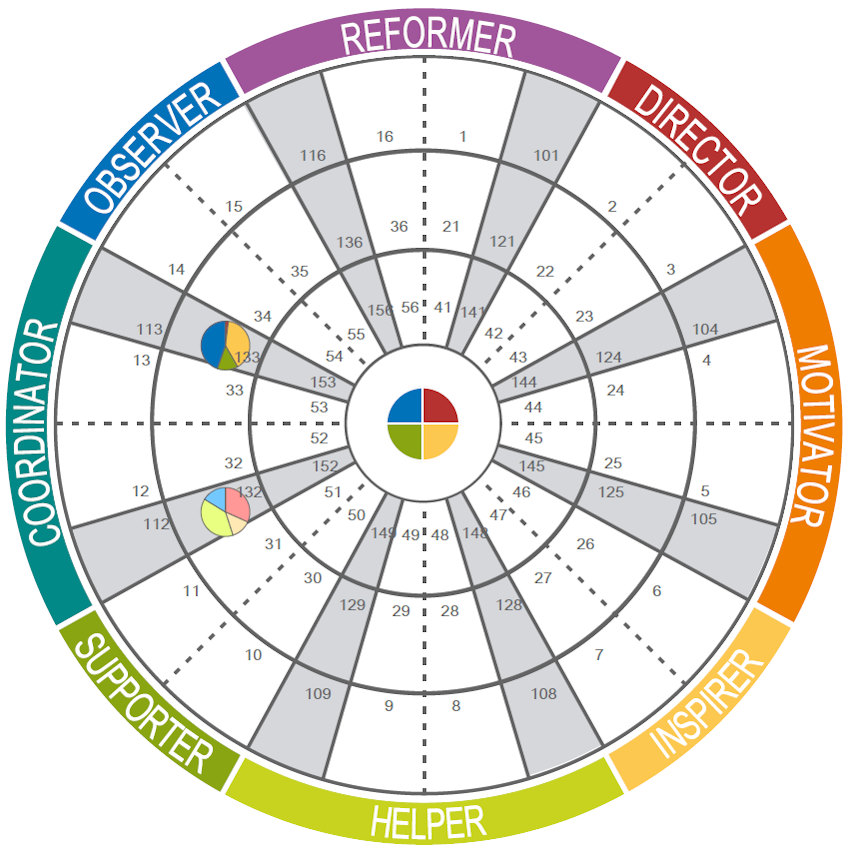
Discovery Full Circle – An Insights Discovery Solution
A Safe and Supportive 360-Degree Feedback Experience
Research consistently shows a strong link between feedback and improved performance, yet feedback often brings challenges and can sometimes be met with hesitation.
Discovery Full Circle provides a solution: a psychologically safe, 360-degree feedback experience that enables individuals to gain a deeper understanding of themselves and how others perceive them. Through this programme, employees build the self-awareness to adapt their communication and working styles, breaking down barriers and enhancing performance.
Based on Insights Discovery, a leading personality profiling tool, Discovery Full Circle uses the familiar language of Insights colour energies. This approach ensures feedback is constructive, non-judgemental, and meaningful—feedback that people feel confident and positive about receiving.
The Discovery Full Circle programme fosters collaboration, boosts team performance, and helps to reduce conflict and stress in the workplace, creating a more harmonious and productive environment.
Download a Sample Full Circle Profile Contact us to book a call with our specialist facilitator
Discovery Full Circle Prioritises Psychological Safety
- Focuses on personality preferences rather than competencies.
- Feedback is framed in the neutral, non-judgmental language of Insights Discovery colour energies.
- Trained facilitators assess an organisation’s readiness for a 360-degree feedback programme.
- All feedback contributors receive training to ensure they’re prepared before providing input.
Click to see the Discovery Full Circle Profile
Based on Self Perception
These statements provide a broad understanding of Joe's personal style, in particular how he interacts with others. Joe, and his feedback group can use this section to gain a better understanding of Joe's approaches to relationships. Additional information is available in the Overview section of the Insights Discovery Personal Profile.
Joe's Interaction with Others
Joe tends to be very sensitive to the way he relates to others and is at his best in situations which run smoothly and harmoniously. He tends to value others but may adopt a romantic, idealised version of people and their potential. He may suppress his own needs in the interest of pleasing others and may feel indispensable to his partner. He may learn to develop many differing aspects of his personality in an effort to win others' approval. He enjoys relating to others, especially on known subjects and existing situations. He enjoys social and harmonious relations with others. He may become possessive of people in whom he has invested a lot of his emotional energy. He has little motivation to lead others through control, but hopes to see everyone living together harmoniously. He has a natural ability to switch his behaviour between feelings that are shared and those that are private in an effort to relate.
An unconditional positive regard for others is a strongly held feeling that Joe values. Joe probably prefers more relaxed social interaction. Do not assume this to be an indication that he is not serious about important issues. He finds it difficult to take a fixed position on issues that are not important to him. As a result, he may be seen by others as rather lacking in conviction. Possessing a quiet strength, his caring, concerned approach to life seems to encourage other people to confide in him. He is gentle, concerned and imaginative and may experience difficulty with people who appear controlling and autocratic. He is an individualistic and independent person, though this may not always be readily apparent due to his desire to maintain warm and harmonious relationships with others. He has strong family ties and to keep in close contact is an essential part of his make-up. He can be unbelieving of, and devastated by, too much personal criticism. Unpleasant working relationships can lead him to lose confidence and motivation. He is not always keen to express how he feels.
Joe ensures his own survival in relationships by serving others, and in so doing, fulfils his own needs and deeper desires to be of service. As most of his energies are directed towards improving the human condition, he has difficulty understanding why he may not always be universally accepted by others. He likes to get on with other people and, although he finds confrontation disagreeable, will retaliate if he feels his values are undermined. He has a high need for affection not found so intensely in other types. He wants to feel significant in other people's lives. His deepest feelings will rarely be articulated. He is careful not to hurt colleagues feelings and will take peoples well-being into account whenever possible. He is seen by most people as kind and sympathetic. At times it is possible for him to so adapt his conversation style that he may be mistaken as extraverted. He may find himself automatically adapting his own personality in an attempt to meet other peoples' ideas of what is desirable
 This section may identify some of the fundamental gifts
that Joe has to offer, indicates how he may show up
under pressure, and lists some possible characteristics
of Joe's natural leadership approach. It is important to
remember these statements were generated using the
Insights Discovery software system based on responses to
the evaluator and were not words or statements chosen by
Joe.
This section may identify some of the fundamental gifts
that Joe has to offer, indicates how he may show up
under pressure, and lists some possible characteristics
of Joe's natural leadership approach. It is important to
remember these statements were generated using the
Insights Discovery software system based on responses to
the evaluator and were not words or statements chosen by
Joe.
Key Strengths:
- Looks for the harmony in every situation.
- Can facilitate resolution of interpersonal conflict between others.
- Sensitive to the needs of others.
When under pressure, Joe may appear in this way:
- A lack of confidence in his own judgement, although that judgement is often correct.
- Over-tolerant of others' inability to perform.
- Has difficulty in sharing concerns and reservations except with close and trusted peers.
In leading others Joe may:
- Be too trusting of his people.
- Use “gut feel” effectively in processing information.
- Over-complicate issues by trying to solve too many things at once.
Based on Self Perception
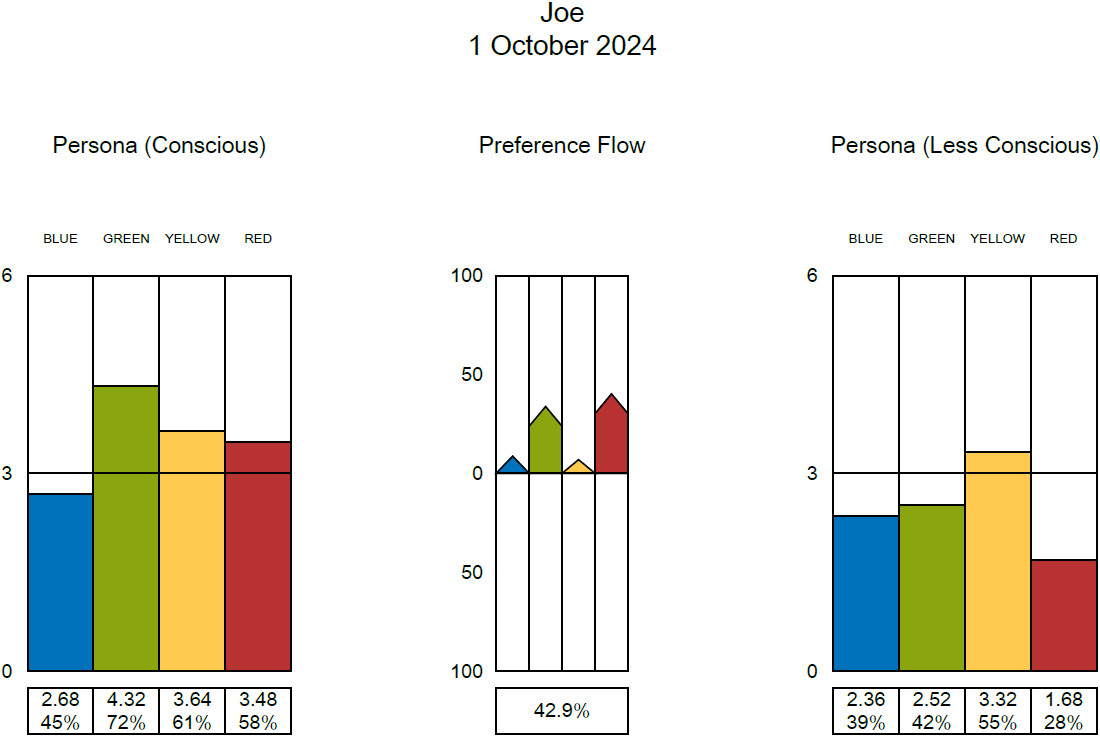
Based on how Joe responded to the evaluator, the dominant colour energy is represented by the highest scoring colour bar in the Persona (Conscious) graph above. Applying the information received in this Discovery Full Circle Profile, in everyday interactions with others as well as with the individuals who filled out an evaluator for Joe, there is an opportunity to adapt to others' styles to improve the quality of his interactions.
 Based on the combined perception of the feedback group,
this section identifies some of Joe's Key Strengths, how
he may show up under pressure and his natural style
in leading others. It is important to remember these
statements were generated using the Insights Discovery
software system based on responses to the evaluator and
were not words or statements chosen by the Feedback
Group.
Based on the combined perception of the feedback group,
this section identifies some of Joe's Key Strengths, how
he may show up under pressure and his natural style
in leading others. It is important to remember these
statements were generated using the Insights Discovery
software system based on responses to the evaluator and
were not words or statements chosen by the Feedback
Group.
The Feedback Group may perceive Joe to have these Key Strengths:
- Assertive, strong communicator who thinks on his feet.
- Effective and efficient time manager.
- Practical, agile and spontaneous.
When under pressure, Joe may appear to the Feedback Group in this way:
- May not actively listen to (or hear) others' points of view.
- Reluctant to seek help from others.
- Sometimes a perfectionist, impatient and intolerant.
As perceived by the Feedback Group, in leading others, Joe may:
- Search for accuracy or perfection, at times appearing overly critical.
- Prefer organising ideas and information rather than people.
- Get involved in the detail.
Based on Feedback Group Perception
Represented on the wheel are the individual perceptions of Joe from the feedback group, the collective perception, and Joe's self perception.
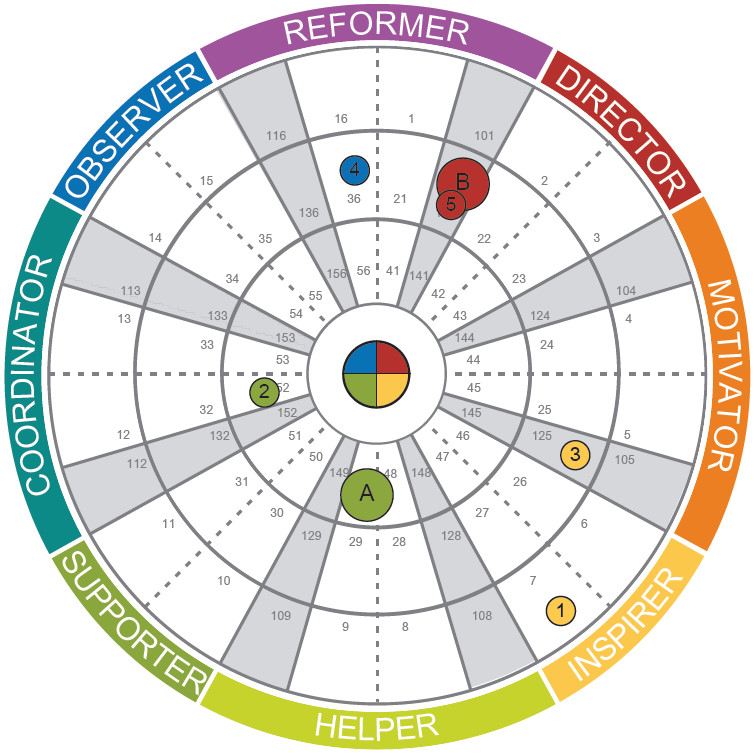

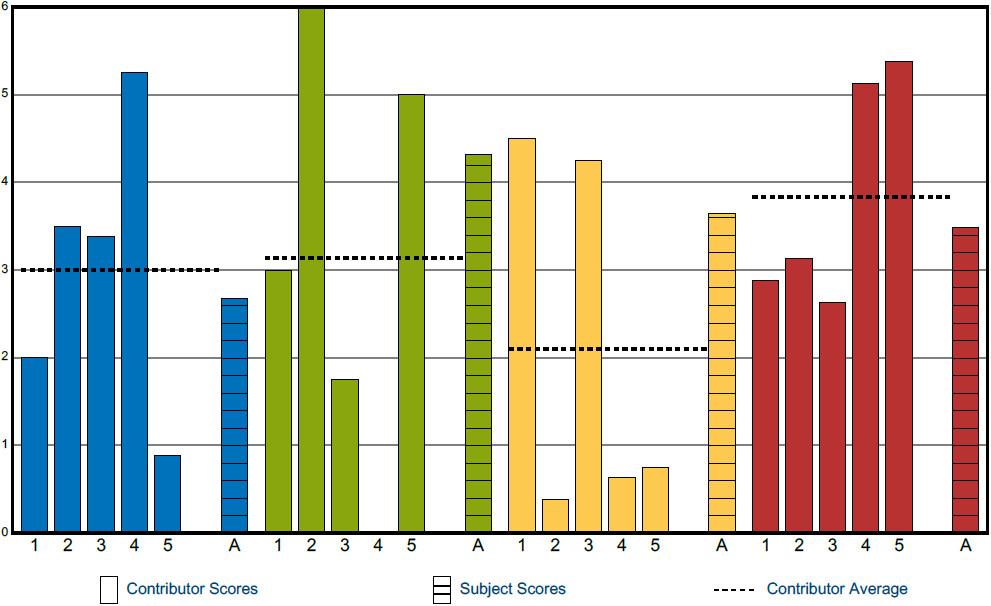
| ID | Name | BLUE | GREEN | YELLOW | RED |
|---|---|---|---|---|---|
| 1 | Contributor TEAM_MEMBER | 2.00 | 2.99 | 4.50 | 2.88 |
| 2 | Contributor CUSTOMER | 3.50 | 6.00 | 0.38 | 3.13 |
| 3 | Contributor MANAGER | 3.38 | 1.75 | 4.25 | 2.63 |
| 4 | Contributor OTHER | 5.25 | 0.00 | 0.63 | 5.13 |
| 5 | Contributor PEER | 0.88 | 5.00 | 0.75 | 5.38 |
| A | Joe | 2.68 | 4.32 | 3.64 | 3.48 |
| B | Group Average | 3.00 | 3.14 | 2.10 | 3.83 |
In the individual graphic below, when a colour bar is seen to the left of 0 this indicates that an individual from the feedback group sees less of that colour energy than Joe sees in himself. A colour bar to the right of 0 indicates the individual sees more of that colour energy compared to Joe's self perception.
Individual: Graphical
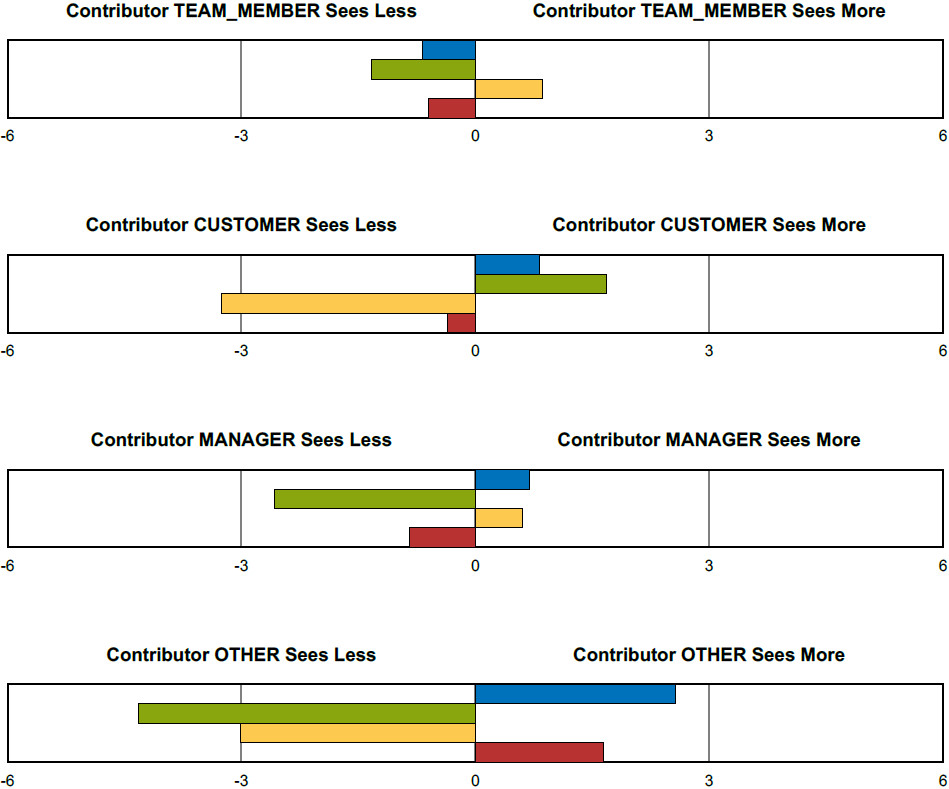

The individual numeric table indicates the difference in colour scores between the individual and Joe, which are represented graphically on the previous page. A minus score indicates the individual sees less of that colour with a positive score indicating they see more of that energy. The aggregate graphical and numeric table display the average for the feedback group compared with Joe's self perception.
Individual: Numeric
| Blue | Green | Yellow | Red | |
|---|---|---|---|---|
| Contributor TEAM_MEMBER's difference | -0.68 | -1.33 | +0.86 | -0.60 |
| Contributor CUSTOMER's difference | +0.82 | +1.68 | -3.26 | -0.35 |
| Contributor MANAGER's difference | +0.70 | -2.57 | +0.61 | -0.85 |
| Contributor OTHER's difference | +2.57 | -4.32 | -3.01 | +1.65 |
| Contributor PEER's difference | -1.80 | +0.68 | -2.89 | +1.90 |
Collective Perception: Graphical

Collective Perception: Numeric
| Blue | Green | Yellow | Red | |
|---|---|---|---|---|
| Joe | 2.68 | 4.32 | 3.64 | 3.48 |
| Group Average | 3.00 | 3.14 | 2.10 | 3.83 |
| Difference | +0.32 | -1.18 | -1.54 | +0.35 |
| Group High | 5.25 | 6.00 | 4.50 | 5.38 |
This page displays the aggregate data for each role compared with the self perception of Joe.
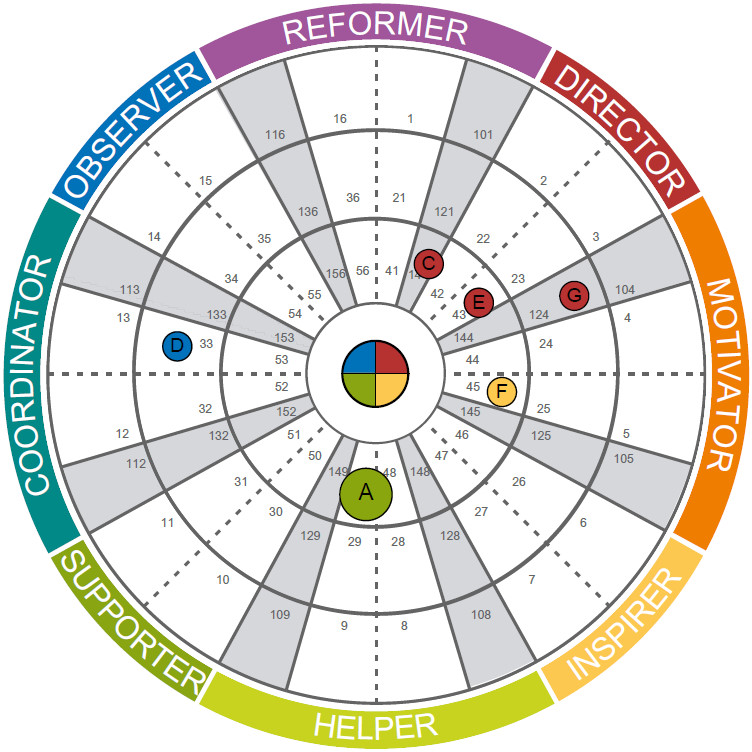

Detailed below is the difference between the average feedback for each Role and the self perception of Joe. The table indicates a summary of scores for each of the Roles.
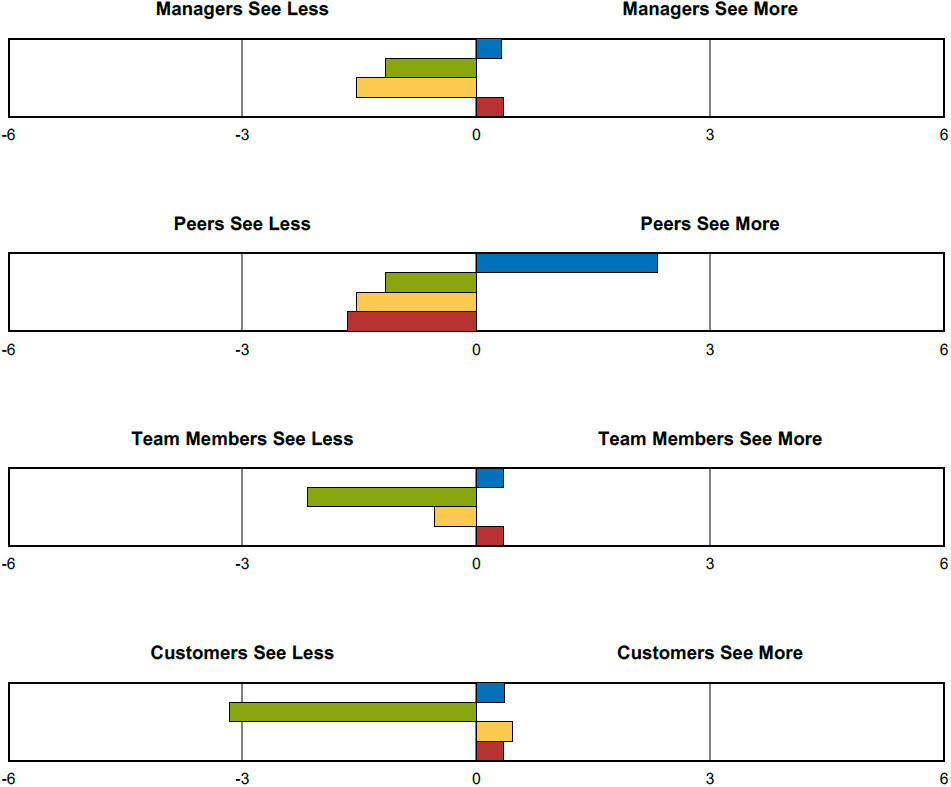

Colour score comparison for Joe and the average feedback by role
| Blue | Green | Yellow | Red | |
|---|---|---|---|---|
| Joe | 2.68 | 4.32 | 3.64 | 3.48 |
| Manager Average | 3.01 | 3.15 | 2.10 | 3.83 |
| Difference | +0.33 | -1.17 | -1.54 | +0.35 |
| Peer Average | 5.00 | 3.15 | 2.10 | 1.83 |
| Difference | +2.32 | -1.17 | -1.54 | -1.65 |
| Team Member Average | 3.03 | 2.15 | 3.10 | 3.83 |
| Difference | +0.35 | -2.17 | -0.54 | +0.35 |
| Customer Average | 3.04 | 1.15 | 4.10 | 3.83 |
| Difference | +0.36 | -3.17 | +0.46 | +0.35 |
| Other Average | 1.00 | 3.15 | 2.10 | 5.83 |
| Difference | -1.68 | -1.17 | -1.54 | +2.35 |
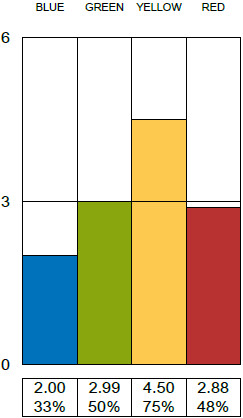
This section may identify some of the fundamental gifts, as perceived by Contributor TEAM_MEMBER, that Joe has to offer, indicate how he may show up under pressure, and list some possible characteristics of Joe's natural leadership approach. It is important to remember these statements were generated using the Insights Discovery software system based on responses to the evaluator and were not words or statements chosen by Contributor TEAM_MEMBER.
Contributor TEAM_MEMBER may perceive Joe to have these Key Strengths:
- Ability to see options and alternatives.
- Can be bubbly, effusive and spontaneous.
- Enjoys and seeks variety.
When under pressure, Joe may appear to Contributor TEAM_MEMBER in this way:
- May be prone to embellishing the truth.
- Often fails to delegate, or delegates too little.
- May become disengaged if bored or forced to moderate tedious tasks.
As perceived by Contributor TEAM_MEMBER, in leading others, Joe may:
- Be inconsistent in delegation.
- Prompt people who naturally work at a slower pace.
- Inspire the team with his grand visions.
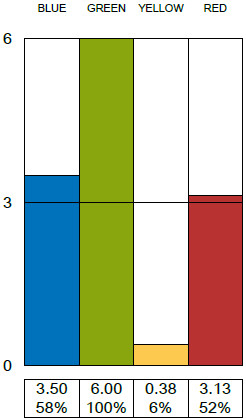
This section may identify some of the fundamental gifts, as perceived by Contributor CUSTOMER, that Joe has to offer, indicate how he may show up under pressure, and list some possible characteristics of Joe's natural leadership approach. It is important to remember these statements were generated using the Insights Discovery software system based on responses to the evaluator and were not words or statements chosen by Contributor CUSTOMER.
Contributor CUSTOMER may perceive Joe to have these Key Strengths:
- Learns from experience - won't get hurt by the same situation twice.
- In touch with himself and his world.
- A sound sense of duty.
When under pressure, Joe may appear to Contributor CUSTOMER in this way:
- Can look for flaws and errors in almost everything.
- Can seek perfection, yet underrates and underestimates his contribution.
- May become stubborn if pressured.
As perceived by Contributor CUSTOMER, in leading others, Joe may:
- Challenge unfairness and seek to moderate it.
- Find it difficult to accept radical ideas. His ideas are down to earth and firmly based.
- Delegate tasks, but find it difficult to let go of the reins on extensive projects.
Communication can only be effective if it is received and understood by the recipient. This section identifies some of the key strategies, which may lead to effective communication with Contributor CUSTOMER.
Where Discovery data is available, this page contains information relating to Contributor CUSTOMER's personal profile. The graphic identifies Contributor CUSTOMER's 'footprint' on the Discovery Wheel and compares it with Joe's 'footprint', also displaying the 'footprint' for Contributor CUSTOMER's perception of Joe.
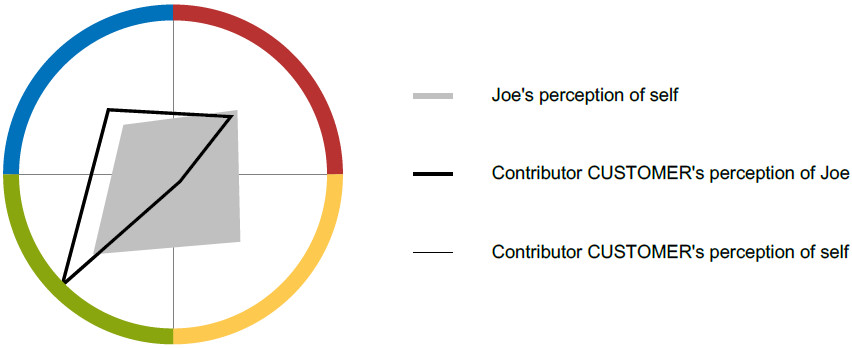
Strategies for communicating with Contributor CUSTOMER:
- Ensure he sees and agrees with the benefit of change before implementation.
- Maintain a serious disposition.
When communicating with Contributor CUSTOMER, DO NOT:
- Get too excited or emotional.
- Fail to respect his need for occasional isolation.
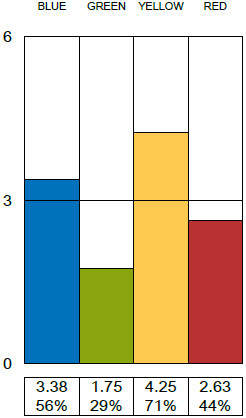
This section may identify some of the fundamental gifts, as perceived by Contributor MANAGER, that Joe has to offer, indicate how he may show up under pressure, and list some possible characteristics of Joe's natural leadership approach. It is important to remember these statements were generated using the Insights Discovery software system based on responses to the evaluator and were not words or statements chosen by Contributor MANAGER.
Contributor MANAGER may perceive Joe to have these Key Strengths:
- Grasps opportunities quickly.
- Ability to see options and alternatives.
- Investigative, interested and inventive.
When under pressure, Joe may appear to Contributor MANAGER in this way:
- May not dot all the “i”s and cross all the “t”s.
- Dislikes and avoids routine tasks.
- Vocally defends his faults when challenged.
As perceived by Contributor MANAGER, in leading others, Joe may:
- Welcome free expression within the team.
- Create an air of bustle to help with the meeting of deadlines.
- Find it difficult to prioritise tasks.
Communication can only be effective if it is received and understood by the recipient. This section identifies some of the key strategies, which may lead to effective communication with Contributor MANAGER.
Where Discovery data is available, this page contains information relating to Contributor MANAGER's personal profile. The graphic identifies Contributor MANAGER's 'footprint' on the Discovery Wheel and compares it with Joe's 'footprint', also displaying the 'footprint' for Contributor MANAGER's perception of Joe.
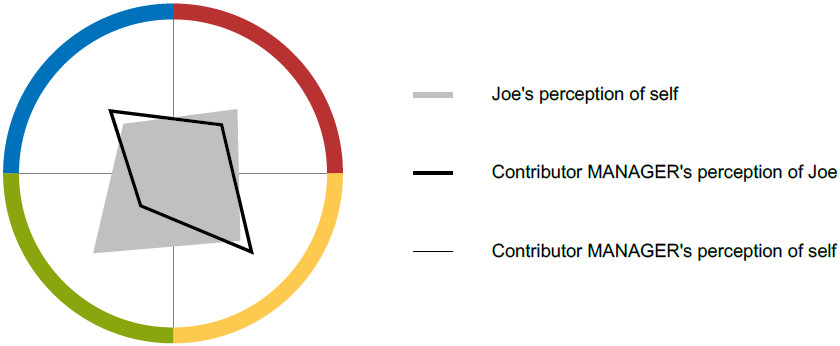
Strategies for communicating with Contributor MANAGER:
- Do not obstruct opportunities for his development.
- Respect his individuality.
When communicating with Contributor MANAGER, DO NOT:
- Take credit for his ideas.
- Compete directly with him for control.
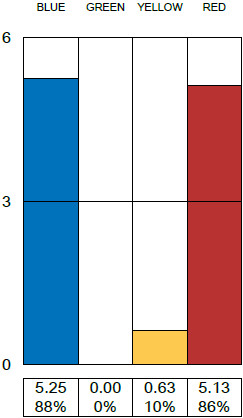
This section may identify some of the fundamental gifts, as perceived by Contributor OTHER, that Joe has to offer, indicate how he may show up under pressure, and list some possible characteristics of Joe's natural leadership approach. It is important to remember these statements were generated using the Insights Discovery software system based on responses to the evaluator and were not words or statements chosen by Contributor OTHER.
Contributor OTHER may perceive Joe to have these Key Strengths:
- Able to see the larger picture.
- Ingenious thinker with a great ability in long range planning.
- Curious about processes.
When under pressure, Joe may appear to Contributor OTHER in this way:
- Dislikes and rebuts personal criticism.
- Could appear to be too demanding of exact standards.
- May appear impersonal, distant and ignore the “human factors”.
As perceived by Contributor OTHER, in leading others, Joe may:
- Neglect praise when praise is due.
- Prefer organising ideas and information rather than people.
- Get involved in the detail.
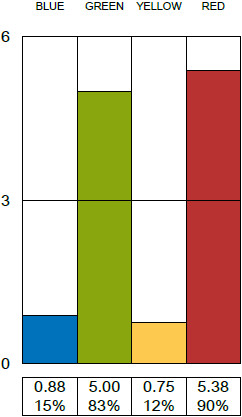
This section may identify some of the fundamental gifts, as perceived by Contributor PEER, that Joe has to offer, indicate how he may show up under pressure, and list some possible characteristics of Joe's natural leadership approach. It is important to remember these statements were generated using the Insights Discovery software system based on responses to the evaluator and were not words or statements chosen by Contributor PEER.
Contributor PEER may perceive Joe to have these Key Strengths:
- Keeps control in a crisis.
- Effective implementer, will readily accept responsibility.
- Self disciplined, confident and convincing.
When under pressure, Joe may appear to Contributor PEER in this way:
- Sometimes perceived as arrogant and inflexible.
- May appear cold and unfeeling.
- Fears dropping his guard.
As perceived by Contributor PEER, in leading others, Joe may:
- Focus more on internalised values, at times failing to take account of the views of others.
- Want to explain the “What”, “How” and “Why”.
- Become irritated with lack of organisation, preparation or perfection.
Communication can only be effective if it is received and understood by the recipient. This section identifies some of the key strategies, which may lead to effective communication with Contributor PEER.
Where Discovery data is available, this page contains information relating to Contributor PEER's personal profile. The graphic identifies Contributor PEER's 'footprint' on the Discovery Wheel and compares it with Joe's 'footprint', also displaying the 'footprint' for Contributor PEER's perception of Joe.
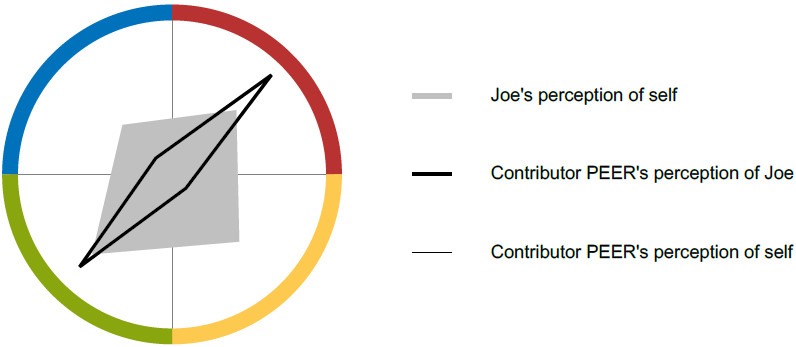
Strategies for communicating with Contributor PEER:
- Agree with him wherever possible.
- Be ready to leave quickly.
When communicating with Contributor PEER, DO NOT:
- Try to manipulate him towards your viewpoint.
- Dream with him - unless you can spare the time!
This section displays the Discovery wheel positions of the Feedback Group. Positions on the wheel do not represent good or bad, but different approaches to situations.
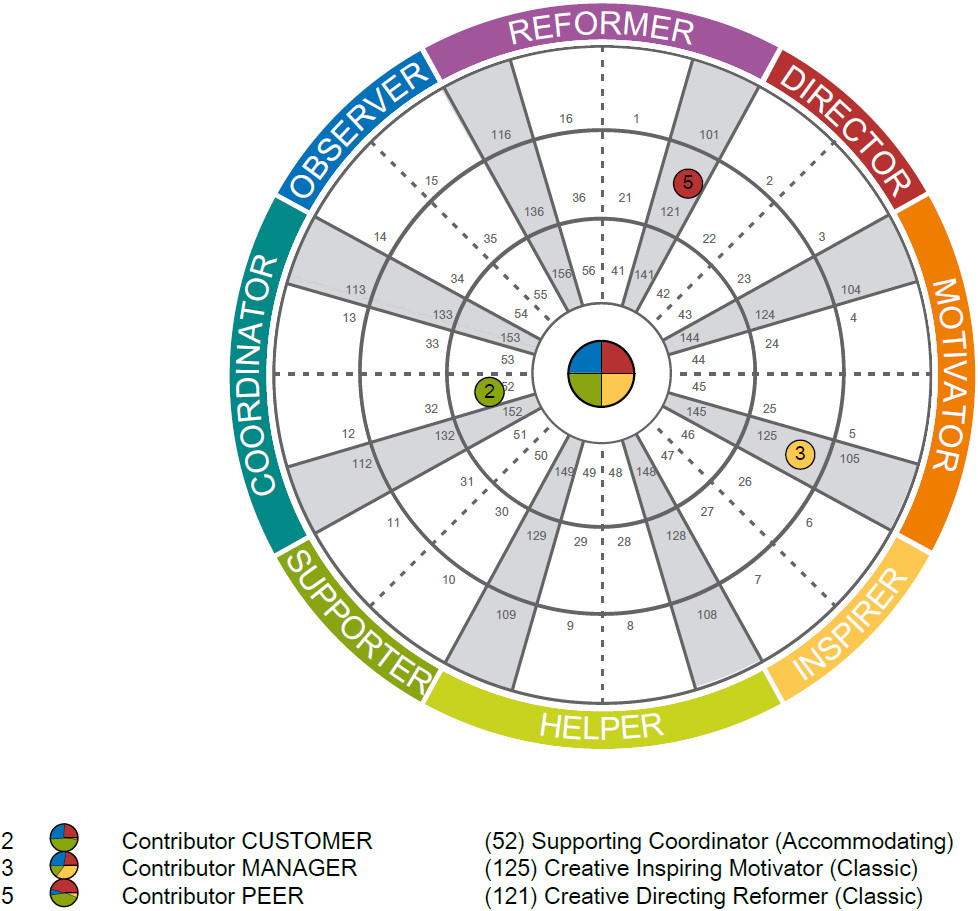
Elevate your conference with a dynamic keynote speech
Insights Discovery Keynote Speaker: Paul Rhodes

Are you looking for a dynamic and engaging keynote topic for your conference? Consider Insights Discovery!
Insights Discovery is a powerful tool that can help organisations improve communication, collaboration, and overall performance. A keynote speech on Insights Discovery will provide attendees with a deep understanding of the Insights model and how it can be applied in their personal and professional lives.
Attendees will learn how to use Insights Discovery to improve communication and collaboration within their teams and discover their own personality type and how it affects their communication and work style. They will leave with practical tools and strategies for effectively working with others who have different personality type.
Having a keynote on Insights Discovery at your conference will provide valuable insights and skills that attendees can immediately apply to their work and relationships. Don't miss out on the opportunity to offer this transformative topic to your attendees.
Our keynote speaker, Paul Rhodes, is an expert in the Insights Discovery model, an engaging presenter and has delivered hundreds of Insights Discovery workshops to thousands of delegates.
Contact us today to learn more.
Boost your team bonding and productivity with a fun-filled day out
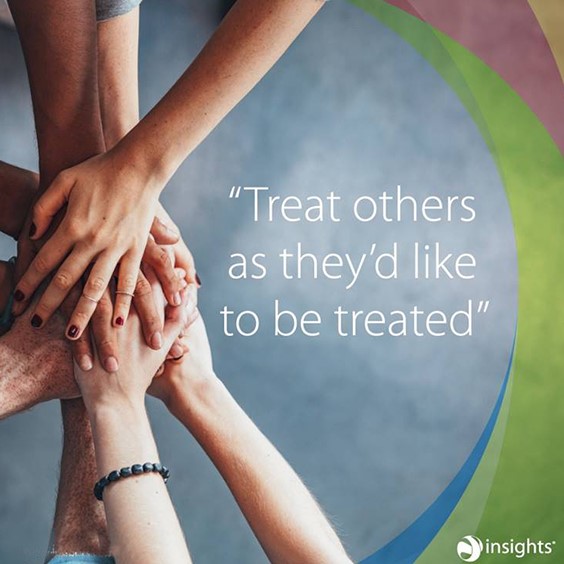
Insights Discovery is a powerful tool for team building and improving communication and understanding within a team. On a team building day out, here's how you can use Insights Discovery to get the most out of your event:
Pre-event preparation: Each team member completes the Insights Discovery Personal Profile, which provides a comprehensive understanding of their individual personality and communication style.
Introducing Insights Discovery: During the team building day, facilitators can lead a session introducing the Insights Discovery model and how it can be used to improve team dynamics.
Team dynamics: Team members can then discuss their Personal Profiles and how they relate to their team roles and responsibilities. This can help team members better understand and appreciate each other's strengths and differences.
Communication and conflict resolution: Insights Discovery can also be used to improve communication and resolve conflicts within the team. By understanding each other's communication styles, team members can tailor their approach to better connect with one another and resolve any misunderstandings.
Action planning: As a team, use the insights gained from Insights Discovery to create an action plan for improving team dynamics and communication going forward.
Overall, incorporating Insights Discovery into your team building day out can help improve team cohesion, communication, and productivity.
Contact us today to learn more.
What is Insights Discovery?
Insights Discovery is a dynamic personality assessment tool that aids in self-discovery and understanding others. Based on Carl Jung’s theories of psychological types, it highlights a unique mix of four color energies—Fiery Red, Sunshine Yellow, Earth Green, and Cool Blue—to represent individual behavioral preferences. This model helps individuals see where they fit on a spectrum of thinking and communication styles, providing a common language for fostering more effective and empathetic interactions in personal and professional settings.
Each participant receives a personalized profile that details strengths, communication styles, and development tips. This tool is frequently used for self-improvement, team building, and leadership training, equipping individuals with insights that are easily applied in day-to-day interactions to create a supportive work culture. Insights Discovery not only helps individuals understand their own style but also appreciate the diversity within teams, which can enhance collaboration and reduce conflict, benefiting organisations overall.
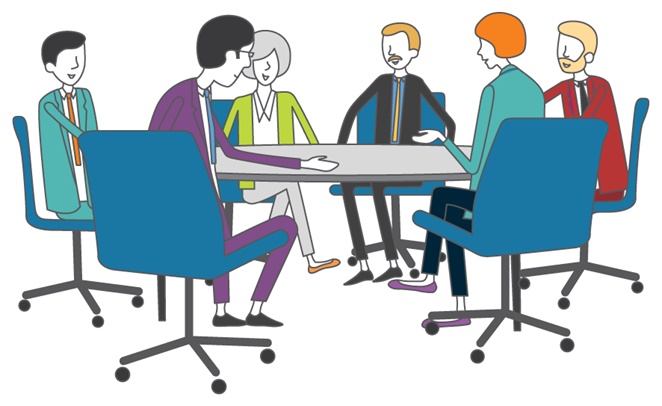
Insights Discovery Accreditation
Becoming an Insights Practitioner involves completing a certification program offered by Insights, the company that developed the Insights Discovery system. The program is designed for individuals who want to become qualified to use the Insights Discovery system and related tools with individuals, teams, and organisations.
The certification program typically involves attending four-day workshops and completing a series of assessments and assignments that demonstrate your understanding and application of the Insights Discovery system.
Once you have completed the certification program and met the required standards, you will be qualified to use the Insights Discovery system and related tools in your work as an Insights Practitioner. This may involve conducting workshops, coaching sessions, team-building activities, and other interventions that are designed to help individuals and teams improve their communication, collaboration, and overall effectiveness.
Download Accreditation Face to Face Factsheet
Download Accreditation Virtual Delivery Factsheet
Contact us today to learn more.

The Benefits of working with Seven Institute as an Insight's Distributor.
Seven Institute is a Licensed Insights Discovery distributor. We work to support both companies and consultants along their Insights journey. We offer discounted accreditation fees (run by Insights directly) and discounts on the Insights Discovery products. Practitioner's working with us will have their own Insights online administration portal to create and manage their profiles and team wheels.
Tuhura - An Insights Discovery Digital Platform
What is Tuhura?
Tuhura is an online digital platform that transforms your Insights Discovery profiles into a dynamic and interactive experience.
Why should I use Tuhura?
- Become a more connected and collaborative organisation
- Provide your team with tools that bring the Insights profile to life
- Discover more about your employees' preferences using advanced AI technology
- Dive deeper into employee development using Tuhura’s masterclass training
How much does Tuhura Cost?
Tuhura is free for anyone that has purchased an Insights Discovery profile from Seven Institute. If you already have a profile or if you are a CP or LP, you can purchase Tuhura here www.tuhura.co.uk
Profile data visualisation
Profile sharing and collaboration
Contact us about TuhuraProfile analysis using AI technology
Visit TuhuraOur Insights Discovery Resources
Improve your communication skills with our colour wheel tool
Discover how to effectively communicate with different personalities and insights using practical tips and strategies. Become an expert in understanding and adapting to various communication styles. Click on each colour separately to learn more and start improving your communication skills now!
Click on each of the colour energies to review the communication do’s and dont's.

Communicating Strategies when interacting with Fiery Red Energy - Do’s
- Do not obstruct opportunities for her development.
- Be humorous, but don't humour her.
- Speak quickly and clearly.
- Go prepared to get straight down to business.
- Point out the consequences, with care.
- Be realistic while offering possibilities and solutions.
- Be enthusiastic and positive.
- Be diplomatic, or else.
- Take responsibility for your own actions and errors.
- Be prepared to get a quick decision.
- Leave personalities out of the discussion.
- Let her decide on the way forward
Communicating Strategies when interacting with Fiery Red Energy - Don’ts
- Be messy, unstructured or ill-equipped.
- Be indecisive, unclear or "woolly".
- Overload her with facts, details and paperwork.
- Try to control the conversation.
- Try to hoodwink or mislead.
- "Fudge"" the issue or waffle.
- Talk slowly, mumble or whisper.
- Be unenthusiastic or negative.
- Criticise her ideas too harshly or personally.
- Try to pin the blame on her.
- Forget to agree outcomes or decide conclusions.
- Interrupt her while she is in control.

Communicating Strategies when interacting with Earth Green Energy - Do’s
- Be clear and concise, and concentrate on the task in hand.
- Leave time for the relationship as well as the task.
- Deal with him in an honest and sincere way.
- Let him know the unique contribution he is making.
- Be careful to maintain the status quo.
- Explain why, what and how, and do it clearly and concisely.
- Give him time to reflect inwardly.
- Give him time to express himself.
- Appeal to his need to be of service.
- Allow him time to gather his thoughts and to express his feelings.
- Balance opportunities for reflection with gentle conversation or interaction.
- Respect his need to be alone for extended periods.
Communicating Strategies when interacting with Earth Green Energy - Don’ts
- Be brusque, overbearing or harness him to unrealistic deadlines.
- Expect him to be a visionary.
- Dismiss his work, ideas or opinions lightly.
- Ask him to make a group presentation without ample preparation time.
- Reinforce his own self criticism.
- Attempt to disguise your true motives.
- Discourage his participation by forcibly suppressing his viewpoint.
- Ignore or be dismissive of his suggestions.
- Use his quiet demeanour to seek to dominate or control.
- Assume that because you have “told it like it is”, this will make the slightest difference to the way that he does things.
- Assume passivity is tacit disagreement.
- Force him to take a positive stance on an issue without time for thought.

Communicating Strategies when interacting with Cool Blue Energy - Do’s
- Ensure you have a logical reason for any changes.
- Ensure that your statements are accurate and factual.
- Be clear and concise, and concentrate on the task in hand.
- Give her time to express herself.
- If you must criticise, do it slowly, constructively and honestly.
- Ensure that she understands the rules.
- Go prepared to get straight down to business.
- Leave personalities out of the discussion.
- Use "should" rather than "must".
- Remember to ask for her opinions of other systems and projects.
- Be sure that she is ready to communicate before pressing ahead.
- Be thorough, organised and on time.
Communicating Strategies when interacting with Cool Blue Energy - Don’ts
- Dismiss her work, ideas or opinions lightly.
- Ask her to make a group presentation without ample preparation time.
- Expect her to immediately strike up close relationships or friendships.
- Be over-humorous in a serious situation.
- Stray from the agenda.
- Break promises.
- Do not assume that her lack of response means tacit agreement with what is proposed.
- Fail to respect her need for occasional isolation.
- Try to rush her into a decision.
- Argue emotionally around her specialist areas.
- Reinforce her own self criticism.
- Undermine her authority.

Communicating Strategies when interacting with Sunshine Yellow Energy - Do’s
- Acknowledge his talent for leadership.
- Ask for his thoughts and ideas.
- Be prepared to share problems openly.
- Don't always expect brief, specific answers.
- Maintain regular, informal feedback.
- Talk tangibly and with enthusiasm.
- Use a casual, informal style of conversation.
- Maintain personal content in communication.
- Be enthusiastic and positive.
- Match his pace in presenting to him.
- Be alive and entertaining.
- Talk about him and areas he finds stimulating.
Communicating Strategies when interacting with Sunshine Yellow Energy - Don’ts
- Impose a “can't be done” or defeatist attitude on him.
- Speak too slowly or hesitantly.
- Dream with him - unless you can spare the time!
- Unnecessarily challenge ideas or actions.
- Take issue with his demeanour or jaunty disposition.
- Forget to agree outcomes or decide conclusions.
- Ignore or disregard his views.
- Create a hostile environment devoid of feelings.
- Involve him in formal, lengthy or tedious meetings.
- Insist on cumbersome reporting procedures.
- Be vague or leave things open to interpretation.
- Stick rigidly to business issues.
Insights Discovery - Beginning your Journey
At Seven Institute, we are a trusted distributor and partner of Insights Discovery. This innovative model leverages four distinct color energies—Fiery Red, Sunshine Yellow, Earth Green, and Cool Blue—to elevate individual organisational performance. By tapping into these energies, leaders, managers, and teams can significantly enhance communication and collaboration.
Curious about how Insights Discovery can benefit your organisation? Watch our video to see how identifying the dominant color energy in each individual fosters better understanding and drives positive change. Learn how a shared language of colour can transform workplace dynamics, improve team cohesion, and boost productivity.
Seven Institute provides access to top-quality resources and support to seamlessly integrate this powerful model into your organisation. Enhance your team dynamics and cultivate a harmonious work environment with Insights Discovery
Don't miss out on this opportunity! Click and watch our video to gain a deeper understanding of this impactful tool and learn how it can make a significant difference in your workplace.
Contact us today to learn more.
Insights E-learning
Are you looking for an E-Learning solution as a supplement to your organisations Insights Discovery journey? Our online learning solutions include two Insights Discovery modules, Beginning your Journey and Insights Discovery for Leadership. Both modules take around 15-20 minutes to complete, can be provided as a file for your learning management system (we can also provide CORTEX LEARN LMS platform if you don’t have one).
Click on the link below for an example of the learning. Please contact us for more information.
Soft skills and Insights Discovery blended learning options
Presentation Skills to Different Energies of the Insights Wheel

Presenting information to the different colour energies can be a challenging experience. In this workshop delegates will learn how to design messages that appeal to all 72 energies of the insights colour wheel, including the Fiery Red, Cool Blue, Sunshine Yellow, and Earth Green energy types. We will explore the key drivers that will help engage each energy, what to avoid, and discover what response you can expect from a mixed energy audience. Delegates will get to practice delivering a message to their opposite colour energy and understand more about their own personal learning preferences.
Influence and Persuasion based on Insights Discovery Profile

We are all selling something, whether it's a product, a service, an idea, or just an opinion on where to go for your summer holiday. Having the ability to influence and persuade your clients, your boss or your partner is a communication essential if you want to succeed in life. In this workshop delegates will learn what influences people based on their Insights Discovery profile and personal preferences. Delegates will learn to identify and recognise the Fiery red, Cool Blue, Sunshine Yellow, and Earth Green energy types and how to best adapt their behaviour to ensure the message influences others effectively.
Coaching Conversations using Insights Discovery Profile

Learn how to have breakthrough conversations using Insights Discovery. Whether you are managing a team or looking to improve your coaching skills this course will uncover the key elements required before, during, and after a coaching conversation. Delegates will learn how to have challenging conversations to change behaviour or drive results, expansive conversations to evoke emotion and discover possibilities, supportive conversations that recognise individual contribution and positively raise self-awareness, and informative conversations to share knowledge, give facts and evaluation options.
Have Effective Meetings Using Insights Discovery Profile
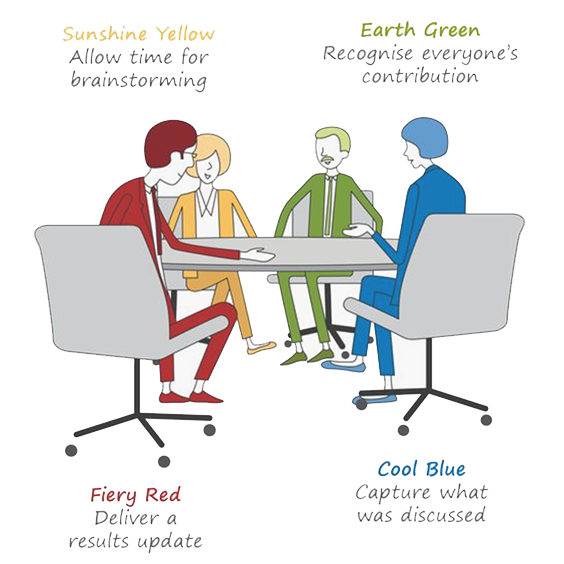
Use the Insights Discovery colour energies to succeed during meetings in a whole way. Delegates will learn how to establish ground rules for effective meetings using the Insights Discovery model as a foundation. Understand how to gain the Fiery Red, Cool Blue, Sunshine Yellow, and Earth Green energy types involvement in every meeting. Create a safe, structured environment that will make the most of the time spent together whether it's a team meeting, a client meeting or a one-one brainstorming session. Learn how to use props to control conversations and stay on track.
Helping Employees understand their Insights Discovery Profile

This workshop is specifically designed for leaders, managers, supervisors and other employees that are required to explain the Insights Discovery profile to other staff. Delegates will gain increased confidence and understanding around each of the profile sections and how to effectively debrief others. We will look at hints and tips that delegates can use when discussing each section and find out how to recognise topics for further discussion. Delegates will get hands-on experience and practice interpreting individual profiles and how to use the feedback to hold effective performance appraisal sessions.
Using Insights Discovery Profile to Solve Business Challenges
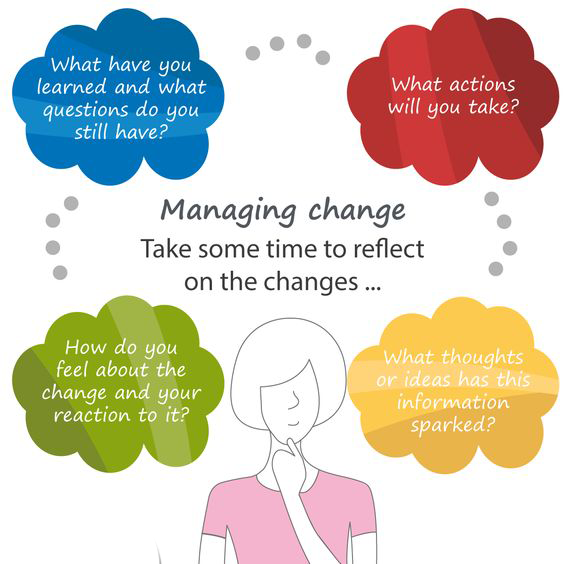
There are many challenges facing businesses in the post-postmodern society of ours (how many posts are we up to these days?): getting the best out of people, ensuring the business is profitable, implementing change, retaining the right people, creating the culture, wellness, the list goes on. This workshop is designed to help leaders identify some of the key challenges they face. Delegates will analyse their business and their specific needs and will learn how they can use the Insights Discovery model to create meaningful solutions using our "Business Challenge Analysis" cards.





